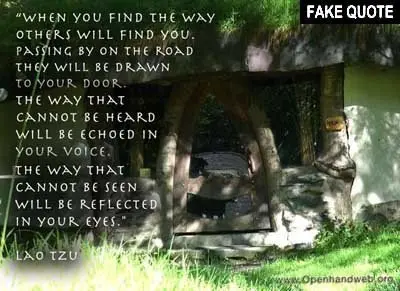|
Tao Te Ching
THE TAOISM OF LAO TZU
|
Fake Lao Tzu Quote"When you find the way..."
This is NOT a quote from Tao Te Ching:"When you find the way others will find you. Passing by on the road they will be drawn to your door. The way that cannot be heard will be echoed in your voice. The way that cannot be seen will be reflected in your eyes."
These are not the words of Lao Tzu, but the quote partly reflects what Tao Te Ching states about following Tao, the Way. Chapter 35 reads (my version):
He said nothing about what version of the Lao Tzu text he got it from, and I have not found it — not even in his own version of Tao Te Ching from 2008. He must have allowed himself some extensive poetic license in this version, and it is most likely based on chapter 35. Dyer's version of that chapter in Living the Wisdom of the Tao from 2008 (page 73) has no likeness to the quote examined here, nor is it more faithful to standard translations of the text. Some of the lines are influenced, to say the least, by Jonathan Star's 2001 version of the chapter (page 48) and the last three lines follow almost completely Stephen Mitchell's 1988 version (page 35). It is strange that Dyer would more or less improvise the long quote examined here and claim it to be from Lao Tzu. In his 1992 book, Dyer quoted Lao Tzu three times more, neglecting to mention his sources. But they are easy enough to find. On page 72 he quoted the last lines of Arthur Waley's 1934 version of chapter 11 in Tao Te Ching (page 155), with the only change of replacing one word with a synonym. On page 126 he quoted a part of chapter 25 from Tao: The Watercourse Way, 1975, by Alan Watts (page 41). On page 230 he used the same source for part of chapter 38 (page 109). Just the quote examined here remains a mystery. Its source is found if "the way" is replaced by "the TAO," which is what Benjamin Hoff wrote in his version of Tao Te Ching from 1981, called The Way to Life: At the Heart of the Tao Te Ching. Hoff is most famous for the book he published the following year — The Tao of Pooh, where he had Winnie the Pooh explain Taoism. The quote examined here is the beginning of Hoff's version of chapter 35. Dyer only made the little change to "the way." Hoff's wording deviates much more than that from the standard translations. My version is given above. Here is how chapter 35 begins in Philip J. Ivanhoe's version from 2002 (page 35):
Another quote from Hoff's Tao Te Ching version is discussed in the chapter Stop leaving. For more about Wayne W. Dyer and his interpretations, see the chapter Every human being's essential nature.
Stefan Stenudd September 22, 2020.
More Fake Lao Tzu QuotesThere are many more fake Lao Tzu quotes examined on this website. Click the header to see a list of them.
Fake interview with the authorClick the header to read a "fake" interview with Stefan Stenudd, the author of Fake Lao Tzu Quotes.
About CookiesMy Other Websites:I Ching OnlineThe 64 hexagrams of the Chinese classic I Ching and what they mean in divination. Try it online for free.
Qi Energy ExercisesThe ancient Chinese life energy qi (chi) explained, with simple instructions on how to exercise it.
Life EnergyThe many ancient and modern life force beliefs all over the world explained and compared.
Taoismen på svenska
Other Books by Stefan StenuddClick the image to see the book at Amazon (paid link).
The Greek philosophers and what they thought about cosmology, myth, and the gods. |
 Tao Te Ching
Tao Te Ching Now it's a book, too!
Now it's a book, too! Tao Quotes
Tao Quotes Cosmos of the Ancients
Cosmos of the Ancients Qi — Increase Your Life Energy
Qi — Increase Your Life Energy Aikido Principles
Aikido Principles Life Energy Encyclopedia
Life Energy Encyclopedia Archetypes of Mythology
Archetypes of Mythology Psychoanalysis of Mythology
Psychoanalysis of Mythology Stefan Stenudd
Stefan Stenudd